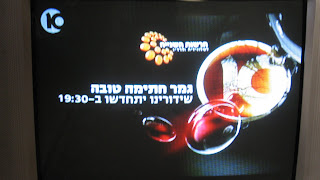He’s behind me, isn’t he? AND He lives next door.
Look, it’s not that bumping into celebrities is uncommon in Israel. It’s the way it happens that is so strange.
After our pre-fast feast, a small number of the diners were walking together from the apartment of the host to the minyan for Kol Nidre. The host’s street in Jerusalem connects directly with “Hanasi” street. Literally “president” street, the street was renamed when the president’s official residence was moved from the elegant British-planned neighborhood of Rechavia to a new compound on the edge of nearby Talbieh.
We have nothing like the Israeli Presidency in the US- some people would say the Surgeon General is close, but even the Surgeon General has more power than the President of the State of Israel. After all, the Surgeon General can address the public and put warnings on things. Plus they get to wear that snazzy retired-Admiral suit. Being President of Israel is kind of like being first lady and trying to help your country, but with the president living in another house and never telling you anything- similar to the Roosevelt Presidency.
Unlike 1600 Pennsylvania Ave, where the main resident doesn’t mind having the whole world know he’s leaving the house, the Shabak staff watching the Israeli president these days takes a very different approach. Which is how the following occurred…
We all crossed onto the street just a few feet past the entrance to the residence. We kept walking down past the edge of the residence with it’s stylized fence.. There were a few dozen guards about, barricades and a receiving line set up opposite the street. One of our party asked what all the barricades were for. I ventured “that’s probably where the president will be davening.” The student at the head of our group, turned around to say to me, “well, why don’t you ask him? He’s right-“ “Behind me, isn’t he?” I turned around, and there was Shimon Peres in a Royal Blue suit, flanked by two of the tallest, best armed Jews in the world. Holding his tallis bag under one arm, a black velvet kippah on his head, and the very weight of the world on his shoulders. It was that expression that stopped me from greeting him- that and the two huge guards.
We must have walked 50 feet before any of us knew he was behind us. And he followed us for two blocks “Right. Well, he’s still behind us,” I mentioned to the group. “Maybe he’s coming to shul with us.” That’s when he crossed the street. You know, he’s shorter than I thought he would be.
Of course, we are still apartment hunting as our current location is just through the holiday season (Sukkot). The last place we saw tonight was a few blocks away from the Jerusalem theatre. As we look for the apartment (which turned out to be a converted garage or workspace), N. mentions that one my favorite teachers says a famous Israeli lives next door. We get to the end of the block, searching for street numbers in the cool of the evening. Of course, there aren’t any. I take a few steps down a lighted pathway to see if there is a number for the house on the side of the building, but there isn’t one. Lots of light and many voices are coming out of the house.
I duck back quickly towards the road. A cab is waiting in front of the home. A voice comes form behind me, warm and curious. “You have something for me?” he asks. I recognize the face of this man and try to explain, stumbling over my own bad Hebrew, that we are looking for an apartment at #4. That’s when my wife takes over, calmly naming the family we are looking for. “This is #4- you just want down at the corner.” Israeli style, he walks us down the block a bit. “Here?” we ask. “no, no a bit further down,” he adds. Having regained my wits, I wish the man a flurry of year-end greetings, and he heads back to his house.
“You know, our teacher said that he will be our neighbor if we get this place. I wonder if we could ever have him over ?” Realizing what didn’t click for her, I tell my wife "um… that was him.” “No, it couldn’t be,” she replies. I ask the cab driver, who has pulled over to make a call. “That was him, right?” He looks at me with a smile. “Yes, yes, he lives right there.” I’m not sure she really believes that it was him. She is still a bit sad that while the landlady was so nice, the apartment was a dump. I feel we did great; after all, how often do you get directions from Natan Sharansky while apartment hunting?



